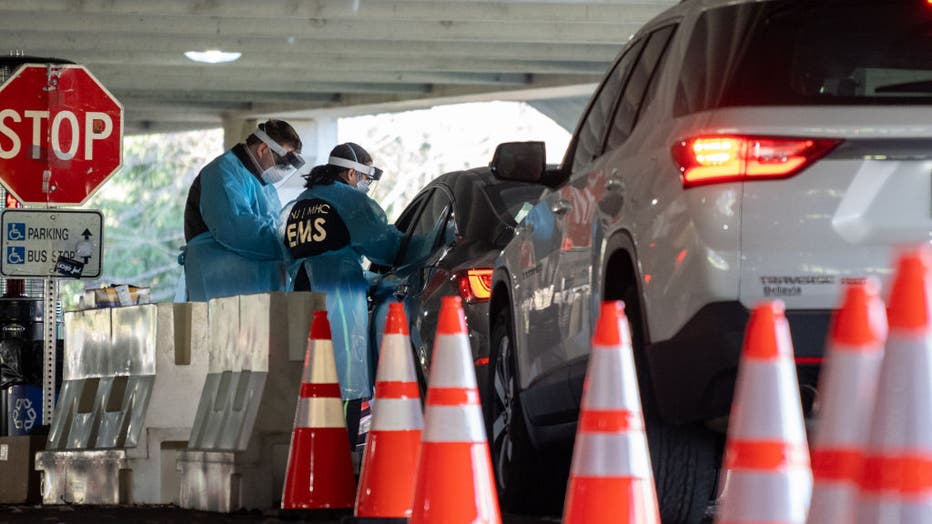States submit coronavirus vaccine orders amid surging death toll
LOS ANGELES - States faced a deadline on Friday to place orders for the coronavirus vaccine as many reported record infections, hospitalizations and deaths, while hospitals were pushed to the breaking point — with the worst feared yet to come.
The number of Americans hospitalized with COVID-19 hit an all-time high in the U.S. on Thursday at 100,667, according to the COVID Tracking Project. That figure has more than doubled over the past month, while new daily cases are averaging 210,000 and deaths are averaging 1,800 per day, according to data compiled by Johns Hopkins University.
Arizona on Friday reported more than 5,000 new COVID-19 cases for the second straight day as the number of available intensive care unit beds fell below 10% statewide. Hospital officials have said the outbreak will exceed hospital capacity this month.
RELATED: Tooth loss, other dental issues reported in COVID-19 patients
Nevada reported 48 new deaths from the coronavirus on Thursday, marking the deadliest day since the onset of the pandemic as case and death totals continued to rise more than a week after new restrictions were implemented on businesses. One hospital was so full it was treating patients in an auxiliary unit in the parking garage.
North Carolina reported a record 5,600 new confirmed cases Thursday and 2,100 hospitalizations, as it awaited nearly 85,000 doses of the Pfizer vaccine, perhaps as early as Dec. 15.
Health officials fear the situation will get worse before it gets better because of delayed effects from Thanksgiving, when millions of Americans disregarded warnings to stay home and celebrate only with members of their household.
At the same time, hospitals — and their workers — were stretched to the limit.

People come to be tested for COVID-19 at a test site in a parking lot at Bergen Community College run by Bergen County and the Bergen New Bridge Medical center on December 3, 2020 in Paramus, New Jersey. (Photo by David Dee Delgado/Getty Images)
In Pennsylvania, almost half of all hospitals in the south-central region and a third of those in the southwest anticipated staffing shortages within a week, according to the state Department of Health.
The state’s top health official, Dr. Rachel Levine, said Thursday that 85% of the state’s intensive care beds were occupied and modeling shows they’ll be full this month. Meanwhile, nurses in the Philadelphia area said the overwhelming number of COVID-19 patients was affecting the quality of care they can provide.
“I see that as a significant concern that we need to work to avoid,” Levine said. “I hear from physicians and from hospital leadership all the time about how strained the hospitals are.”
Officials also expressed concern that Americans will let down their guard once states begin administering vaccines.
It will take weeks to months before many of the nation's most vulnerable residents can be immunized, White House coronavirus response coordinator Dr. Deborah Birx said Thursday. Until then, she said, Americans must not hold indoor gatherings with outsiders or take off their masks at any time when they’re outdoors — and continue to keep their distance from others and wash their hands.
“I think everyone can see that this current surge that we’re experiencing is much faster and broader across the United States and is lasting longer,” Birx said after attending a meeting at United Nations headquarters in New York.
An influential modeling group at the University of Washington said Friday the expected vaccine rollout in the United States will mean 9,000 fewer deaths by April 1. The Institute for Health Metrics and Evaluation predicts that warmer temperatures and then rising vaccination rates will lead to steady declines in the daily death toll starting in February.
But even with a vaccine, if states do not act to bring current surges under control, the death toll could reach 770,000 by April 1, the group said.
Nationwide, the coronavirus is blamed for almost 277,000 deaths and 14 million confirmed infections.
As states prepared to vaccinate residents, most appeared to be heeding nonbinding guidelines adopted this week by the Centers for Disease Control and Prevention to put health care workers and nursing home patients first.
Connecticut Gov. Ned Lamont said nursing home residents, along with front-line health care workers, will get the first doses.
“These are the folks most likely to suffer complications. These are the older folks who most likely suffer fatalities. And these are the folks most likely to go into the hospital,” Lamont told reporters Thursday. Connecticut expects to receive its first shipment of 31,000 doses of vaccine from Pfizer on Dec. 14 and its first shipment of 61,000 from Moderna on Dec. 21.
But states also were balancing concerns about the economy and protecting essential workers.
Kansas Gov. Laura Kelly said the state’s vaccine plan calls for the first shots to go to front-line health care workers with a high risk of coronavirus exposure, including workers in nursing homes, as well as nursing home residents. Meatpacking plant workers and grocery store employees will be next in line, along with first responders.

